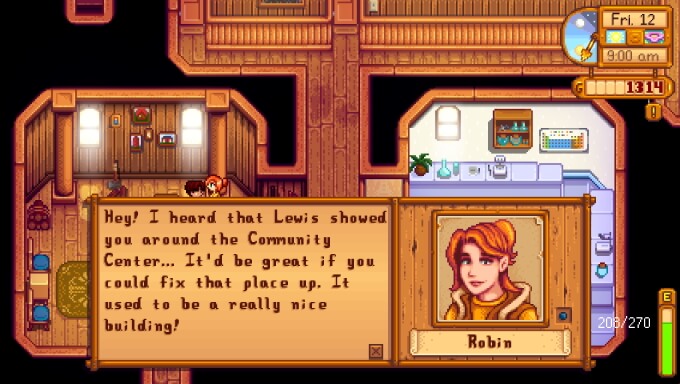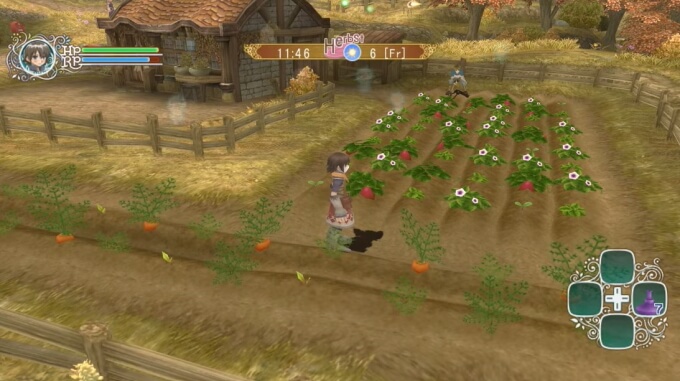
Farming For A Purpose
How many people will your turnips feed?
June 26, 2022
For a while I've held the opinion that Stardew Valley is bland and has stagnated the farming game genre in recent years in both graphics and gameplay innovations. I plan to do a post about that in the future when I have the opportunity to play a couple old Harvest Moon games to make a proper comparison (to make sure I'm not talking out of my ass), but for now I want to talk another aspect that has bothered me about the genre as a whole even before Stardew: what purpose does the farming serve?
Take my words with a grain of salt here since I have not "finished" Stardew Valley, but my interpretation of the themes of the game is as follows:
You, the protagonist, have had enough of getting your soul drained by corporate life and have decided to take up your grandfather's offer to go live in a rural town. You take up farming mainly as a form of therapy, but you also make a few bucks in the process by selling your produce. After getting settled, you can alter the fate of the town by choosing between two paths: one is, ironically, selling the remainder of your newly mended soul to the same corporation you escaped from and helping spread the tendrils of capitalism to one of the last bastions of whatever the "old ways" might be. Or, you can make a deal with the local supernatural beings to rebuild the community center and bring a genuine sense of unity to the town once more.
I'm going to get this out of the way first: I'm not going to make the point of "why can't Robin just rebuild the community center" as tempting as it might be. I haven't gotten an actual answer from the games so far, but my interpretation is that the individualism encouraged by Joja's way of living made people stop caring about the community as a whole. Robin only builds structures she is paid to – it is a monetary service and not an act of altruism, so it is thematically on point. Either that, or the community center simply will not have the necessary properties without Junimo magic or some other explicit lore technicality.

It still feels a bit insensitive when she hits you with this line, as this reddit user points out.
How does farming play into this anyways? In the Joja route, your produce is converted to money and that money then goes to funding Joja's local operations. It's as simple as that. In the community center route, some of your crops get donated to the Junimo as offerings in return for them rebuilding the community center, which leads to the social bonds of the citizens of Stardew Valley getting strengthened... somehow. Even if you have no friendship points with any of the citizens, it's made clear that restoring the community center will help restore the actual community in some way.
While one of these routes is obviously the better one for not supporting a corporation, both of them have your produce be handed off to be used as a trading resource instead of being used for their obvious function: being eaten. Sure, you can argue that selling your crops to Pierre means people will buy them from him and then turn them into dishes. Or you could also make a dish yourself and hand it directly to one of the villagers, who will supposedly eat it all on the spot.
But will they really?
In Stardew it's at least implied that Pierre's store is failing – though that's mostly because of competition with Joja and not due to lack of goods – but in a lot of farming games the general store is somehow kept stocked even if you never use your tools. Some games such as Rune Factory Frontier even show the shopkeeper and other NPCs tending to their own crops, making your own farming matter even less!

What is the point, Erik, what is the point?! Taken from this youtube video.
I want to make clear that this is not a plot hole: much like in Stardew the main purpose of letting you farm is not the act of growing food itself – in most RF games it's to repay the gratitude of being given a place to live for free. In Harvest Moon, you take care of the farm simply because you inherited it, and it is taken away from you after a couple of years if the people of the town decide that you haven't put enough effort into it. If they can afford to let you potentially do nothing with the farm for that long, then they must have another reliable source of food.
It's this dissonance that bothers me – farming obviously does make you progress through the games, but the result of your hard work is first converted into an easily quantifiable resource like money or contribution points ("Bungus Tokens", as I called them while playing the Roots of Pacha demo) before being evaluated. Even if you make a dish out of your crops yourself and hand it to one of the villagers, that dish will be converted into friendship points and the act will be abstracted down to a simple gift exchange.
You're never told the ultimate result of your actions: how many people will your turnips feed? Is the ale you brew going to be stocked at the local tavern in preparation for an upcoming festival? Will Abigail let my blackberry cobbler sit in her fridge for months untouched because she keeps eating amethysts instead? I'm aware there's exceptions and special events where your contributions get acknowledged – please let me know about those because I love hearing about that kind of stuff! – but the games weren't really built with that dynamic in mind.
A common question I get when I talk about this is: so you want farming games to have higher stakes? And my answer to that is... kinda, but not necessarily. I acknowledge that farming games are a genre meant for more relaxed gaming experiences (even if they are sort of an optimization game at their heart), and having a whole town starve if you don't drop 10 cucumbers into the shipping bin in time is obviously not something many people want to see after a long day at their full-time job.
But what if the stakes were higher? Aside from starvation, you could lean into the economic aspect of it. The Rune Factory games sometimes brush against the subject of the relationship between big empires and small rural towns – something I felt was sorely missing in RF5 since RF4's ending was all about the big evil empire getting defeated. What if your job was to restore a war-torn village's farms so that they don't become dependent on whoever won the war for supplies?
Even without stakes, there's still ways to make your farming matter. That's where the general store paradox could come into play! If you don't farm, the NPCs can get their food from there, but if you do farm, maybe you could have someone come up to you and say, "thank you for growing seasonal crops, I was tired of eating the same stuff every day because the stock never changes". Or maybe you could get new recipes if you hand plants to a chef that never had access to them before.
That's what got me excited about the upcoming game Roots of Pacha: even if your resources are ultimately turned into contribution points (Bungus Tokens), you get this sensation that your hard work will ultimately help your clan of cavepeople prosper. One of the quest rewards is a sundial, which mechanically adds a "hour and minutes" display to the day progress display, but is also outside your hut (which is shared, not just yours!) and so lore-wise will let everyone tell the time with more precision, which is something they couldn't do before.
The Roots of Pacha demo obviously had some features missing and unpolished aspects, and also a "break rocks randomly until you hit the one that opens the passage to the next room of the caves" mechanic that ultimately made me end my play session early, but it's this strong connection between farming and growing your community that I want to see more from farming games from now on.